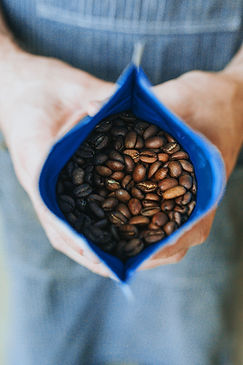
Our Coffee
As it's thought that coffee originated in Ethiopia, it's also believed it made its way north, across the Red Sea into Yemen in the 15th Century. It then started to grow here in the Yemeni district of Arabia, and by the 16th century it was known in Persia, Egypt, Syria, and Turkey

Clolombia
Coffee was first introduced into Colombia in the early 17th century by Jesuit priests who arrived with Spanish settlers. The first crops were harvested in the Northeast of Colombia, but soon coffee was quickly adopted across the nation by small, family farms, known as Finca’s.
The first commercial export of Colombian coffee beans didn’t emerge until the first decade in the 18th century. The first shipment of Colombian coffee beans was the start of what would become a major industry. During what was called ‘The Thousand Day War’ the growing industry hit a brief decline. Due to the lull in international coffee prices, many plantation owners were forced to split up the farmland among workers, which gave them local ownership and independence over their own Finca’s. In the early 19th century, a now peaceful Colombia had created a logistic system, allowing rural, small-estate farmers to export their coffee more efficiently. This kick-started a new age growth and gave those farmers a way to carry on producing Colombian coffee, which now accounts for roughly 12% of the worlds coffee supply, with Colombian coffee being one of the biggest names in the coffee industry.
In 1972, the National Federation of Coffee Growers of Colombia was created to protect the interests of coffee growers. The organisation rapidly expanded and now represents a large portion of Colombian coffee farmers. Over the next few years Colombia grew to become the world’s 3rd largest exporter of coffee.
Colombian coffee beans, Arabica coffee, needs to be grown at altitude and between the two tropics, ideally with two wet seasons and volcanic soil. Colombia offers the perfect growing conditions for the Arabica bean, offering the ideal weather and geographical conditions for producing coffee, which is considered some of the best in the world, and is a source of national pride for all Colombian coffee farmers, with coffee growing being the largest source of rural employment in the country.







Brazil
Often Brazilian coffee has got a bad rap amongst coffee connoisseurs as they believe that the focus is on quantity rather than quality, but that couldn’t be further from the truth. Brazil produces a variety of specialist grade, single origin coffees with a high-quality taste unlike any other. Boasting a low acidity, which is widely enjoyed, and notes of caramel and chocolate, Brazilian coffee offers an intense and pleasant flavour that’s perfect for sipping throughout the day.
Despite Brazil’s huge impact on the world of coffee, you rarely hear anything about the consumption of the beverage in the country. That’s because, for Brazil, it has a larger part to play than simply a social element, for its citizens it’s their livelihoods and an important part of the country’s growth. With that being said, drinking coffee in Brazil is still a big part of day-to-day life and consumed in all aspects, whether that’s relaxing, celebrating or kicking back and socialising.


